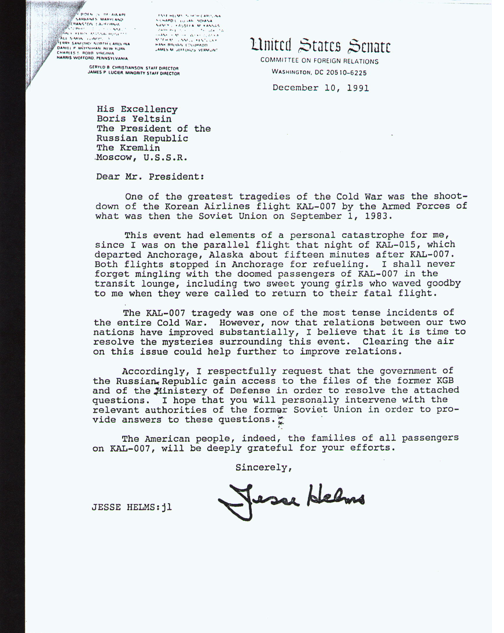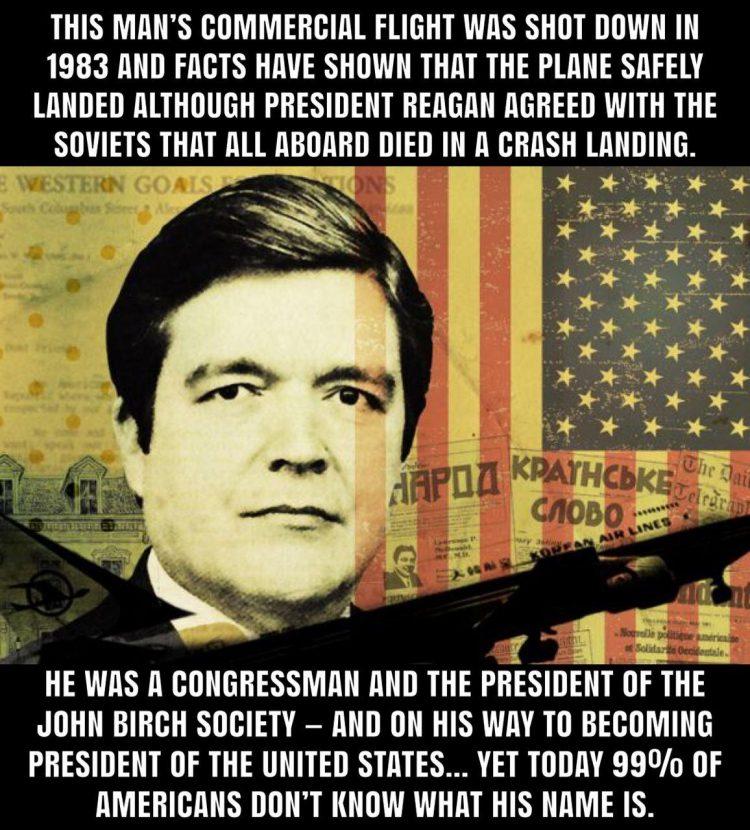
The Man Who Would Be President’s Plane Was Shot down in 1983 – Were the American People Lied To?
By Tim Brown
In 1983, a commercial flight was alleged to have been shot down by Russia, but facts have shown that the plane landed safely, although President Ronald Reagan agreed with the Soviets that all aboard died in a crash landing. One of the men aboard was Congressman Larry MacDonald, one of the few Dr. No’s in Congress. MacDonald was not only the President of the John Birch Society, but he was also on his way to becoming President of the United States. Yet, today, 99% of Americans don’t even know his name. My guest, Bert Schlossberg, had two family members on board that same plane and has put together a massive amount of evidence that the American people were lied to about the fate of KAL007 and the people on board. He joins me to present the information to the American people he has uncovered.
Check out more at http://Rescue007.org
Also follow Bert’s Facebook group KAL 007 Families and Friends
Additional information provided by Bert and mentioned in this episode.
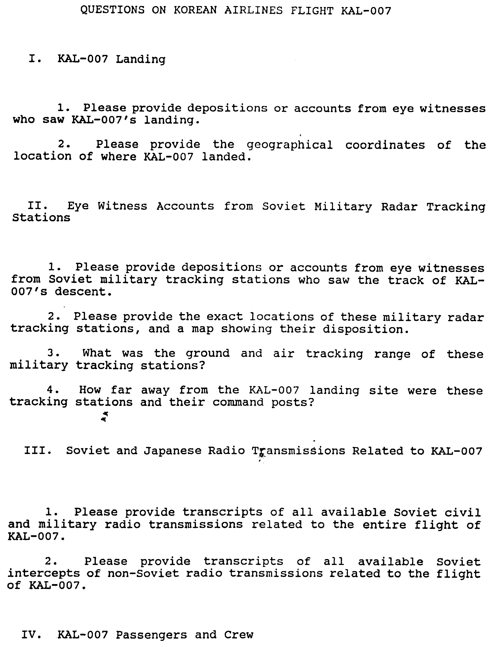

Larry MacDonald’s daughter Mary Elizabeth wrote:
Thus it was that the Soviet Union shot down in international waters a passenger jet with 269 people aboard (Sept. 1, 1983), deceived the world into thinking that they had not done so, at first, and then when it was indisputable, acknowledged the fact (Sept. 9, 1983) but maintained that they did not know it was a passenger civilian plane, until years later (Sept. 9, 1996), the Sukhoi 15 interceptor pilot, Maj. Osipovich, would acknowledge that he knew it before he launched his missiles. And thus it was that the Soviets absconded with the surviving passengers and crew, with not even a whimper of protest from the West or the World.
But what if Congressman Larry McDonald, or the 22 children under 12 years of age, or any others of the occupants of KAL 007 were still alive? When do we stop remembering, stop caring?
Mary Elizabeth McDonald-Loftus, daughter of KAL 007 passenger, Democratic Congressman from Georgia, Larry McDonald, “He is my father and I want the truth!…After so many years not a day goes by that I do not think about him and how much I miss him.”
 On Monday, September 26, 1983, a delegation of seven Japanese and American officials arriving aboard the Japanese patrol boat Tsugaru, met a six-man Soviet delegation at the port of Nevelsk on Sakhalin Island. KGB Major General A. I. Romanenko, the Commander of the Sakhalin and Kuril Islands frontier guard, headed the Soviet delegation.* Romanenko handed over to the Americans and Japanese, among other things, single and paired footwear. With footwear that the Japanese also retrieved, the total came to 213 men’s, women’s and children’s dress shoes, sandals, and sports shoes. The Soviets said that all that they had retrieved, they had found floating in the water or washed up on the shores of Sakhalin and Moneron islands.
On Monday, September 26, 1983, a delegation of seven Japanese and American officials arriving aboard the Japanese patrol boat Tsugaru, met a six-man Soviet delegation at the port of Nevelsk on Sakhalin Island. KGB Major General A. I. Romanenko, the Commander of the Sakhalin and Kuril Islands frontier guard, headed the Soviet delegation.* Romanenko handed over to the Americans and Japanese, among other things, single and paired footwear. With footwear that the Japanese also retrieved, the total came to 213 men’s, women’s and children’s dress shoes, sandals, and sports shoes. The Soviets said that all that they had retrieved, they had found floating in the water or washed up on the shores of Sakhalin and Moneron islands.
From an examination of the shoes in the photo of Life magazine, pairing the sets and counting them with the single shoes, and relating them to the whole, it turns out that the total amount of shoes retrieved account for 198 of the 269 people of KAL 007 – or almost 74% of the total.
Family members of KAL 007 passengers would later state that these shoes were actually worn by their loved ones for the flight on that fateful night. Sonia Munder had no difficulty recognizing the sneakers of her children, one of Christian, age 14 and one of Lisi, age 17, by the intricate way her children laced them. (Sonia confirmed that her children were wearing these shoes when they boarded the flight). Another mother says, “I recognized them just like that. You see, there are all kinds of inconspicuous marks which strangers do not notice. This is how I recognized them. My daughter loved to wear them.”
And yet, another mother (and maybe it takes a mother!), Nan Oldham identified her son, John’s, sneakers from a photo in Life magazine of 55 of the 213 shoes — apparently, a random array on display those first days at Chitose Air Force Base in Japan. “We saw photos of his shoes in a magazine,” says Nan, “We followed up through KAL and a few weeks later, a package arrived. His shoes were inside: size 11 sneakers with cream white paint.” John Oldham had taken his seat in row 31 of KAL 007 wearing those cream white paint spattered sneakers. He had just come from painting his suburban Washington, D.C., family home. Implications the Soviets retrieved the shoes of some portion of this 74% of the flight’s passengers, yet claimed not to have found one single body, not one person. This adds great weight to the question “Where are the bodies?”
Either the shoes were on the bodies and removed by the Soviets (or the Japanese), or they were removed by the wearers and retrieved by the Soviets (or Japanese). Why were these shoes loose? Were they taken off in preparation for the landing or were they simply removed during the course of the flight? In either case, the one great question remains. Is it really possible for so many shoes to be found and not one single person found to wear them? And if we should negate that the shoes were taken off in preparation for a ditching – that there was no time to do so, or the aircraft was in an exploded and too disintegrated condition to do so, then another question arises – If the non-appearance of bodies is explained by their flesh being eaten by crabs, and, contrary to expert opinion, bones eaten by sea creatures, is it really credible, that not one of the 213 items of footwear had a foot, or a toe or a toe bone within it?
The Fate of Gen Romanenko
Note – Gen. Romanenko would meet a bad end due (according to the Republican Staff Report) to his handling of KAL 007 matters. The Republican Staff Study reports that he was probably sent to the Gulag himself. The Israeli Research Centre for Prisons, Psych-Prisons, and Forced Labor Concentration Camps of the USSR, resting on informant information reported, independently and prior to the Staff Study that Romanenko’s name no longer appears in KGB computers. (Once in, a person is noted as reassigned, deceased, retired, etc., but never deleted. It is as if Gen. Romanenko never existed). And finally, Hans Ephraimson-Abt, the head of the US families of the victims association, reports that while he was in East Germany at the Soviet embassy, he was informed by embassy officials that Gen. Romanenko, whom he had come to enquire about (he had not!), had committed suicide. Of course, each in its own time, could have been true.
Could the reason that General Romanenko lost favor, sent to prison camp, committed suicide, name deleted from KGB computers be that he fumbled by dry cleaning passenger items including shoes and included in the items given to the Japanese the personal cards and photos of the passengers, all without water damage or indication of having been in the sea – a telling indication that the items could not have been fished from the waters or waved tossed onto the shores of Moneron or Sakhalin Islands as the Soviets maintained?
What Happened To The Surviving Passengers And Crew After They Were Captured By The Soviets?
Our knowledge of the whereabouts of members of passengers and crew of Korean Air Lines Flight 007, shot down on August 31, 1983, is based primarily on information received by the Research Centre for Prisons, Psych prisons and Forced Labor Concentration Camps of the USSR. This research center was established by the late Avraham Shifrin, an Israeli who had, himself, spent time in the Soviet prison camp system. As a major in the Red Army and prosecutor for the Krasnodar Region, northeast of the Crimea, he was responsible for sending many to the Gulags. After he himself was convicted on charges of spying for the US and Israel, he was sentenced to ten years on the harshest of prisons; then seven years of exile in Kazakhstan. Mr. Shifrin maintained an extensive network of contacts within the Soviet Union and its successor states. Much of the information that we have was obtained at great personal risk by his contacts.
The Centre investigations in 1989 to 1991 determined that the passengers and crew of KAL 007 were taken, upon rescue, to the KGB Coast Guard base on Sakhalin. Within a few days (by September 4, 1983), everyone was taken to the KGB base at Sovetskaja Gavan on the Siberian mainland opposite Sakhalin, roughly 600 miles north of Vladivostok. Here the men, women and children were divided into separate groups. The men and women were taken by train to Tynda on the Baikal-Amur Railway about 800 miles inland where at least some were put to forced labor. The male adults were, at some point, distributed to a number of different camps throughout Siberia some of which were camps that also held American POWs and other foreign prisoners. These camps are identified as camps for foreigners by their total isolation and the lack of villages around them. Normally, when prisoners are released from prison camps they are required to continue living in exile near the prison. Their families join them and villages grow up around the camps. Foreign prisoners are not released; there are no villages around their prisons.
Congressman Lawrence P. McDonald, Democrat, 7th District, Georgia, was separated from the rest of the passengers and taken by special air transport to Moscow on or about Sept. 8, 1983. A special KGB guard unit was brought from Khabarovsk to accompany him. The KGB had a fleet of special aircraft, the 910xx series that was used exclusively for transporting high profile prisoners, VIPs, and others requiring the strictest security. These were used for even very short trips rather than using overland transportation.
The child passengers were kept in Sovetskaja Gavan in a specially established isolated temporary orphanage until the end of October. They were then gradually transferred to various orphanages in Vladivostok, Omsk and Barnaul, both near Novosibirsk, and Kazakhstan based on their racial identity. The intent was to assimilate them into the predominant racial populations in these areas.
Congressman McDonald
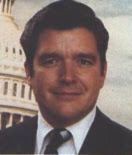 Upon arrival in Moscow, McDonald was taken to the Lubyanka KGB prison where he was given the designation, Prisoner Number 3. While at the Lubyanka, he was kept in isolation, taken from his cell only for questioning. (The halls of Lubyanka are carpeted so that the footsteps of those being led away for questioning cannot be heard in the cells. Everyone is kept under constant observation through peepholes. Those who are allowed a bit of exercise are taken to small fenced in exercise yards on the roofs of the prison high above and invisible from the streets below.) He was interrogated several times by the head of the First Chief Directorate of the KGB, Vladimir Kryuchkov. (Kryuchkov was a member of the core group, the Gang of Eight, who sought to seize power from Mikhail Gorbachev in August 1991. He was arrested when the coup failed but was later released. He attended the inauguration of President Vladimir Putin at Mr. Putinïs personal invitation in 2000. Mr. Kryuchkov is now an internationally known lecturer.)
Upon arrival in Moscow, McDonald was taken to the Lubyanka KGB prison where he was given the designation, Prisoner Number 3. While at the Lubyanka, he was kept in isolation, taken from his cell only for questioning. (The halls of Lubyanka are carpeted so that the footsteps of those being led away for questioning cannot be heard in the cells. Everyone is kept under constant observation through peepholes. Those who are allowed a bit of exercise are taken to small fenced in exercise yards on the roofs of the prison high above and invisible from the streets below.) He was interrogated several times by the head of the First Chief Directorate of the KGB, Vladimir Kryuchkov. (Kryuchkov was a member of the core group, the Gang of Eight, who sought to seize power from Mikhail Gorbachev in August 1991. He was arrested when the coup failed but was later released. He attended the inauguration of President Vladimir Putin at Mr. Putinïs personal invitation in 2000. Mr. Kryuchkov is now an internationally known lecturer.)
Following a number of questionings, Mr. McDonald was moved to the Lefortovo KGB prison also in Moscow for continued interrogation over a period of several months. In Lefortovo, prisoners were kept in cells that were artificially cooled to near freezing temperatures. These cells were about 1.5 meters on a side or roughly 4.5 feet. The dirt floors were submerged in water so that the prisoners either stood or lay down in mud. There might be a slanted bench against which the prisoner could lean with his feet against the opposite wall.
After a time in Lefortovo, Mr. McDonald was then moved to a dacha (summer house) in Sukhanova near Moscow where the interrogations continued. Mr. Shifrins sources indicated that they had strong reason to believe that, while in Sukhanova, McDonald was interrogated under drugs that may have eventually resulted in identity loss. He was brought eventually to a prison in Karaganda, Kazakhstan, the region where the Soviets had important nuclear missile test ranges and similar installations. He may have been brought to this area to be interrogated by experts there as part of the effort to find out what he could say about the US nuclear program and what he knew about the Soviet program.
Early in 1987, former NSA agent, Jerry Mooney, testified before Congress about the Moscow Bound program and the importance of Karaganda as a center of the Soviet nuclear program and an area where certain highly-skilled American POWs with technical knowledge were brought. Following his testimony, the world press focused on this area. In an apparent attempt to keep McDonald’s presence there secret, he was moved in mid-1987, by special transport, to a small prison near the town of Temir-Tau, also in Kazakhstan. (The wardens of this prison identified him from a photograph that had been computer-aged to show what he would have looked like at the time. It also showed a scar that runs from his left nostril to the left end of his lip.)
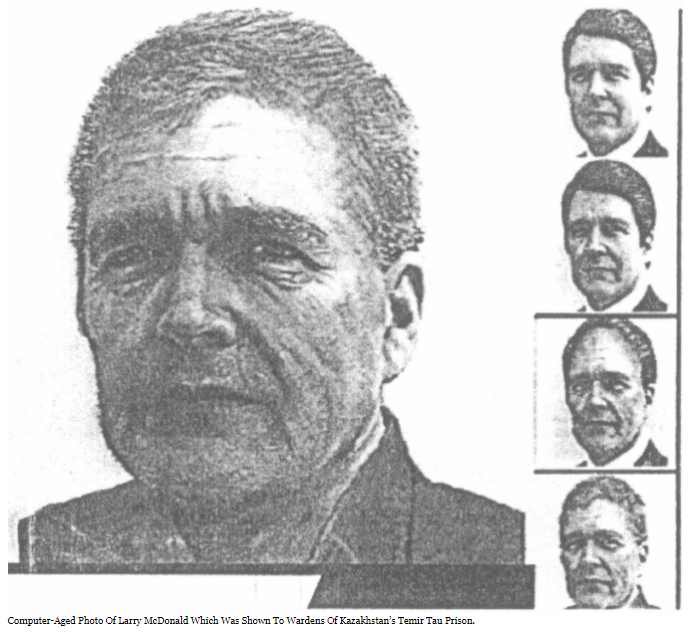
Computer-Aged Photo of Larry McDonald Which Was Shown to Wardens of Kazakhstan’s Temir Tau Prison.
Here he was given special treatment but was not allowed to communicate with anyone. In the summer of 1990, he was taken to the transportation prison in Karaganda. Here, as an unknown prisoner whose file is sealed by the KGB, he remained. As of 1995, all efforts to obtain additional information from the Karaganda prison have failed. The congressman’s present location is unknown it may be there or he may have been moved since then.
Child Passengers
Efforts to track down the children of KAL 007 have been very difficult. Many of the youngest ones were probably adopted into local families. Some information was obtained about two young Caucasian sisters, we believe they were the Grenfell children, Stacey and Noelle, ages 3 and 5, of Rochester, NY. It appears that they were placed in an orphanage in Vladivostok until 1990. The older child, at about 12, was sent to Medical School 3, a type of vocational high school, associated with the city hospital in Khabarovsk for training. The girl in question, whom we think is Noelle, graduated from there three years later then was taken elsewhere and her file removed from the school and hospital. At this point, her trail was lost. This information came from the director of the school.
A Female Passenger
Sources provided information on one young Oriental woman who was set to work felling timber in the area of Tynda, Siberia. Prior to 1985, she lost her left arm below the elbow in a work accident. Subsequently, she was sent across the vast Siberian landmass to the extremely isolated village of Nakhodka on the Tazovskaya Guba (Inlet) above the Arctic Circle where she remained until sometime in the late summer of 1991 or 1992. By this time, she was married and had several children. This village consists of some 20-30 houses occupied by local fishermen and a few Russian exiles. The villagers live in sub-human conditions with almost no contact with the outside world. Winter lasts for most of the year and half the year is spent in Arctic darkness. The conditions are so gruesome that the villagers, few of whom speak Russian, care for nothing but survival and vodka.
The villagers of Nakhodka thought that the woman was of indigenous Nenets origin because of her Oriental features. She did not mix with and was generally unknown to them. They were aware that she had been removed by men in authority. This may have been because the KGB had become aware of efforts by Avraham Shifrin and his Research Institute to locate the woman. He had tried to get his people to this village a year earlier, before she was moved, but promised funding to support the effort did not come through. By the time he was able to raise the necessary funds and recruit volunteers for this very dangerous mission, the woman was gone.
An important point to note is that, even when prisoners were released for whatever reason, they were often sent to isolated villages such as Nakhodka. While apparently having freedom of movement, there was no escape from the pervasive KGB scrutiny. The Soviet KGB used local informants to control residents of such villages. The informants were in turn controlled by threats to the safety of family members who were taken into custody for just this purpose to serve as leverage. The KGB would select trusted members of the community to be their informants. They would then test them by having someone utter anti-Soviet remarks in their presence. When an informant did not report such a remark to his KGB handler he would be informed that members of his family would be deprived of food. If it happened again, they would be shot. Shifrin considered the ingenuity of the KGB to be both diabolical and 100 per cent effective.
Even though the name has changed, the KGB is still as pervasive and powerful as ever, even though it may keep a lower profile. Russian President Vladimir Putin was with the KGB before entering into politics.
Male Adult Passengers
Sources indicate that most of the male passengers and crew were taken to a series of three ultra-secret prison camps in the dense taiga region along the Amur River near the village of Zapokrovsk not far from the Chinese border. These are the same camps where American POWs were known to have been located. They are quite extensive. In the winter, smoke can be seen rising from 80-90 smoke stacks each barracks has two or three stoves, some 30 or more barrack houses. Unfortunately, all efforts to get to the camps and identify passengers visually failed because of the intense security in the area.
Additional camps were in the area of Cita, headquarters of the Far East Theater of Operations of the Soviet military, at Nercinsk, Nercinski Zavod and other locations.
At the time, there were also three other ultra-secret camps for foreign prisoners on Rogers Bay, Wrangell Island in the Arctic Ocean. Mr. Shifrin had reason to believe that some of the passengers and, especially the crew, may have been taken to Wrangell because of their aeronautical training. These camps have since been abandoned and all inmates moved elsewhere.
This is the extent of our current knowledge concerning the locations where the passengers and crew of KAL 007 were taken after being rescued from the downed plane.
Secret Soviet Rescue Mission Transcripts
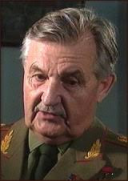 In a short time, starting with the bringing in of General Valentin Varennikov to Sakhalin Island for “damage control”, the Soviets succeeded in concealing the fact that they had known all along, from the very moment of attack, where KAL 007 was located in the air and where it had come down, and to keep the combined air and naval U.S., Japanese, South Korean search and rescue effort from entering the Soviet territorial waters around Moneron Island. The Soviets also were successful hiding the fact that within 1/2 hour of the shoot down, they had ordered air and naval missions of their own to Moneron Island itself, where they had tracked the slow spiral descent of the damaged jumbo jet. These secret missions were kept that way until 1992, when under pressure from Senator Jesse Helms, their existence was finally revealed by the Russian Federation. Yet, the world has hardly taken notice of them and has still failed to “connect the dots” as far as the issue of survivors to this great tragedy is concerned. These are the relevant transcripts.
In a short time, starting with the bringing in of General Valentin Varennikov to Sakhalin Island for “damage control”, the Soviets succeeded in concealing the fact that they had known all along, from the very moment of attack, where KAL 007 was located in the air and where it had come down, and to keep the combined air and naval U.S., Japanese, South Korean search and rescue effort from entering the Soviet territorial waters around Moneron Island. The Soviets also were successful hiding the fact that within 1/2 hour of the shoot down, they had ordered air and naval missions of their own to Moneron Island itself, where they had tracked the slow spiral descent of the damaged jumbo jet. These secret missions were kept that way until 1992, when under pressure from Senator Jesse Helms, their existence was finally revealed by the Russian Federation. Yet, the world has hardly taken notice of them and has still failed to “connect the dots” as far as the issue of survivors to this great tragedy is concerned. These are the relevant transcripts.
Soviet military personnel involvedKornukov—General Anatoli Kornukov, Commander Sokol Air Force Base (Sakhalin). Kornukov was appointed Russia’s new Air Force Commander by Boris Yeltsin on January 22, 1998. He served in this capacity until retiring in January 2002.
Gerasimenko—Lt. Colonel, Acting Commander, 41st Fighter Regiment
Novoseletski—Lt. Colonel, Acting Chief of Staff, Fighter Division, Smirnykh Air Force Base
Titovnin—Lt. Col., Flight controller, Fighter Division Combat Control Center
Strogov—General, Deputy Commander, Far East Military District
Kamenski—General, Commander, Far East Military District Air Force
Times are given in Coordinated Universal Time (UTC, formerly Greenwich Mean Time or GMT). In the air over Sakhalin, it was early in the morning of September 1, 1983.
To KAL 007’s true position, Moneron Island itself, there were, indeed, at least two Soviet rescue operations sent out within minutes of KAL 007’s downing. These missions are documented in the Russian ground-to-ground telecommunications transcripts, and in view of the specificity of KAL 007’s location, there is no reason to doubt their success. The first mission involved rescue helicopters, border guards and the KGB, and was ordered at 18:47, just 21 minutes after missile impact and nine minutes after KAL 007 had reached point zero altitude, point zero being when it went below radar—not when it landed or impacted.
Lt. Col. Novoseletski: (18:47)
You don’t have the sunrise yet?
Lt. Col. Titovnin:
No, it will be in about thirty minutes.
Novoseletski:
Prepare whatever helicopters there are. Rescue helicopters.
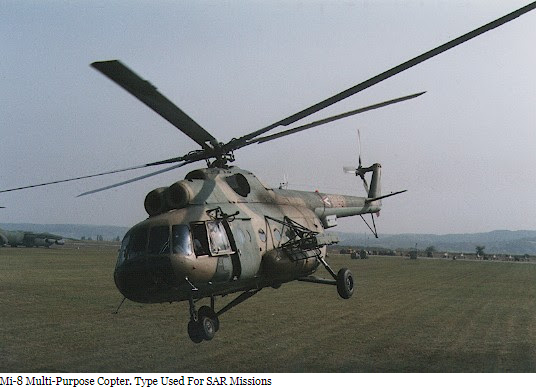
Titovnin:
Rescue?
Novoseletski:
Yes. And there will probably be a task set for the area where the target was lost.
Titovnin:
Roger. Is this to be done through your SAR [Search and Rescue]?
Novoseletski:
Eh?
Titovnin:
Assign the task to Chaika through your SAR, Comrade Colonel, Khomutovo [Civilian and military airport at Yuzhno-Sakhalinsk City in southern Sakhalin] does not come under us and neither does Novoaleksandrovska. We have nothing here.
Novoseletski:
Very well.
Titovnin:
Novoaleksandrovska must be brought to readiness and Khomutovo. The border guards and KGB are at Khomutovo.
“Chaika” is the call sign of the Far East Military District (FEMD) Air Force Command Post. Consequently, this first documented rescue mission could only be effected by order of the FEMD, which was second in jurisdiction to the Soviet Far East Military Theatre of Operations. Neither the shooting down nor the rescue of Flight 007 was, therefore, of local decision.
Apparently, neither Smirnykh Air Force Base in central Sakhalin (under the Tactical Air Command and where the MiG23 ordered to guarantee destruction of KAL 007 was based) and Sokol-Dolinsk Air Force base in southern Sakhalin (under the Air Defense Command where Osipovich and his SU-15 were based) had any available rescue helicopters. Therefore, the jurisdictional step up to the Far East Military District Air Force was required to bring the out-of-jurisdiction Khomutovo Air Base into action. Khomutovo was the civilian and military airbase at Yuzhno (Southern) Sakhalinsk City.
The second mission, ordered by the deputy commander of the Far East Military District, General Strogov, brought in the civilian ships and fishing trawlers in the vicinity of Moneron as well as the border guards. This mission was ordered at 18:55; just 29 minutes after missile detonation and 17 minutes after KAL 007 had reached point zero altitude.
Gen. Strogov: (18:54)
Hello… Hello, Titovnin… You s… [obscenities] I’ll lock you up in the guard house. Why don’t you pick up the phone?
Titovnin:
Comrade General, everyone was busy here.
Strogov:
You have nothing there to be busy with. Busy! What kind of nonsense is that? So, where is Kornukov?
Titovnin:
Kornukov is here.
Strogov:
Put him on the phone.
Titovnin:
One minute. He is reporting to Kamenski, Comrade General.
General Kamenski, commander of the Far East Military District Air Force and superior officer to General Kornukov, was under the commander of the Far East Military District, Ivan Moseivich Tretyak. Here is clear evidence that the shoot-down of KAL 007 and the rescue of its passengers were not decisions made by local commanders but emanated from the highest echelons of the Soviet military.
Strogov: (18:55)
So, what you need to do now. Contact these … [obscenities], these sailors, these, what do you … [obscenities]?
Titovnin:
Border guards?
Strogov:
Huh?
Titovnin:
Border guards?
Strogov:
Well, the civilian sailors.
Titovnin:
Understood.
Strogov:
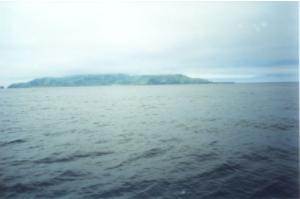 The border guards. What ships do we now have near Moneron Island, if they are civilians, send [them] there immediately.
The border guards. What ships do we now have near Moneron Island, if they are civilians, send [them] there immediately.
Note the consistency of Strogov’s site identification with Kornukov’s. Both generals simply specify it as “Moneron.” Ships that are already “near Moneron” are sent to Moneron itself. Moneron is a small Soviet island, 4 1/2 miles in length and 3 1/2 miles in width, of the western coast of Sakhlin Island. This transcript puts the lie to the Soviet claims, from Day One and on, that they did not know where the plane went down, as well as exposing the Soviet deception in staging their search and rescue operations in various parts of international waters. Among the first proponents of this lie was Marshal Nicolay Ogarkov, U.S.S.R. Chief of General Staff, when he stated on September 9, 1983, at a press conference, “We could not give the precise answer about the spot where it [KAL 007] fell because we ourselves did not know the spot in the first place.” The United States (and the rest of the world for the matter) had been effectively and tragically duped! For an account of how the Soviets duped the U.S., click here.
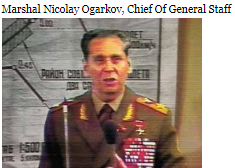
Titovnin:
Understood, Comrade General.
This second of the documented, authorized rescue missions was also authorized by highest authority. General Strogov was directly subordinate to General Ivan Moseivich Tretyak, the Commander of the Far East Military District. It was with General Tretyak that General Vladimir L. Govrov, the Commander of the Far East Theatre of Operations had come into agreement that the “intruder” aircraft must be shot down.
Among the ground-to-ground communications appended to the 1993 ICAO Report, the following conversation (unidentified speakers) is recorded at 18:45:
“Weapons were used, weapons authorized at the highest level. Ivan Moiseevich authorized it. Hello, hello.”
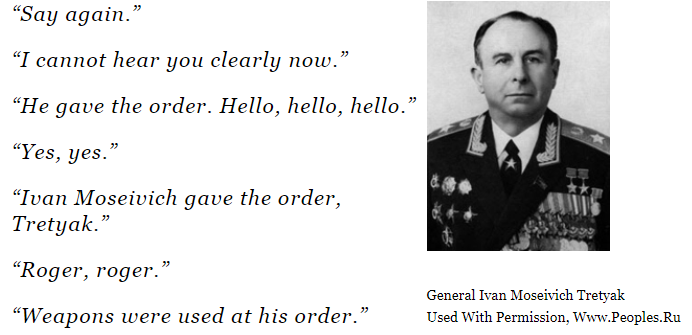
General Ivan Moseivich Tretyak
Used With Permission, Www.Peoples.Ru
“Say again.”
“I cannot hear you clearly now.”
“He gave the order. Hello, hello, hello.”
“Yes, yes.”
“Ivan Moseivich gave the order, Tretyak.”
“Roger, roger.”
“Weapons were used at his order.”
Note 1. That at least one Soviet naval rescue mission had been ordered even before KAL007 had reached the surface of the waters off Moneron is attested by the following – taken from the Izvestia testimony of a Soviet Naval Specialist who had been involved in the rescue mission: “When we learned that the aircraft had been attacked, and that weapons had been used, we began to analyze when it might possibly come down. Ships were ordered to the anticipated [emphasis added] area. Several ships headed there at once at full speed…”
Note 2. According to the 1991 Republican Staff Study/”CIA” Report, “sensitive special intelligence” (NSA intercepts) revealed the following: About four hours after the shoot-down, Soviet Air Defense command posts reported that Soviet pilots were saying that a civilian passenger plane had been shot down instead of a U.S. RC-135 reconnaissance plane, and they (the command posts) were expressing regret, both that they had not downed the RC-135 and that now the Americans would accuse them of killing Americans.
The Study asks how, while flying overhead, could Soviet pilots conclude that Americans were among the passengers? They might conclude from seeing the aircraft’s distinctive hump as the plane floated on the water that it was a passenger plane that was shot down, as in 1983 there were no military versions of the Boeing 747. And they might have seen the distinctive bird emblem on the tail of the aircraft—the symbol in use then by Korean Air Lines—but this would not indicate the nationalities of the passengers. The Study would conclude that the only way Soviet pilots could know that Americans had been killed is if they had heard that information on their radios during the time the rescue was actually taking place.
“Thus the only way that Soviet pilots could possibly have identified the nationality of some of the KAL 007 passengers as Americans, from the air, would have been from possible emergency radio communications which U. S. Intelligence did not intercept, from either the stricken airliner ditched at sea, or from its life rafts, or from Soviet rescue boats.( Republican Staff Study/”CIA” Report , pg. 47)
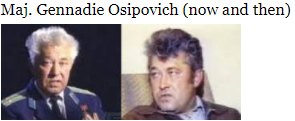
Thus it was that the Soviet Union shot down in international waters a passenger jet with 269 people aboard (Sept. 1, 1983), deceived the world into thinking that they had not done so, at first, and then when it was indisputable, acknowledged the fact (Sept. 9, 1983) but maintained that they did not know it was a passenger civilian plane, until years later (Sept. 9, 1996), the Sukhoi 15 interceptor pilot, Maj. Osipovich, would acknowledge that he knew it before he launched his missiles. And thus it was that the Soviets absconded with the surviving passengers and crew, with not even a whimper of protest from the West or the World.
But what if Congressman Larry McDonald, or the 22 children under 12 years of age, or any others of the occupants of KAL 007 were still alive? When do we stop remembering, stop caring?
Mary Elizabeth McDonald-Loftus, daughter of KAL 007 passenger, Democratic Congressman from Georgia, Larry McDonald, “He is my father and I want the truth!…After so many years not a day goes by that I do not think about him and how much I miss him.”
https://sonsoflibertymedia.com
Sons of Liberty Store: https://thesonsofliberty.squarespace.com/
Support us through a donation: https://thesonsofliberty.squarespace.com/donate
Partner with us as a Son or Daughter of Liberty: https://thesonsofliberty.squarespace.com/membership/
Tim Brown is an author and Editor at FreedomOutpost.com, SonsOfLibertyMedia.com, GunsInTheNews.com and TheWashingtonStandard.com. He is husband to his “more precious than rubies” wife, father of 10 “mighty arrows”, jack of all trades, Christian and lover of liberty. He resides in the U.S. occupied Great State of South Carolina. . Follow Tim on Twitter. Also check him out on Gab, Minds, MeWe, Spreely, Mumbl It and Steemit
Published with Permission of washingtonstandard.com



